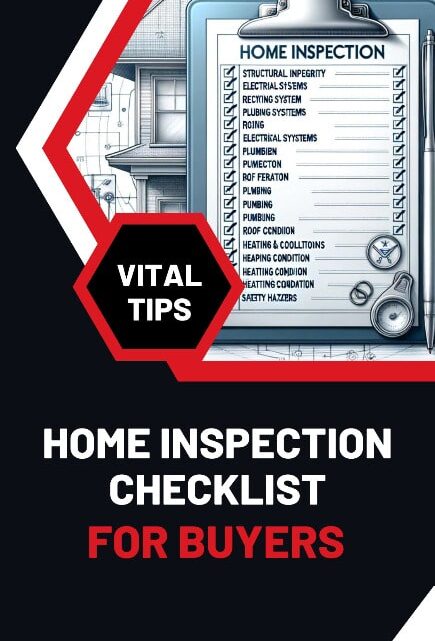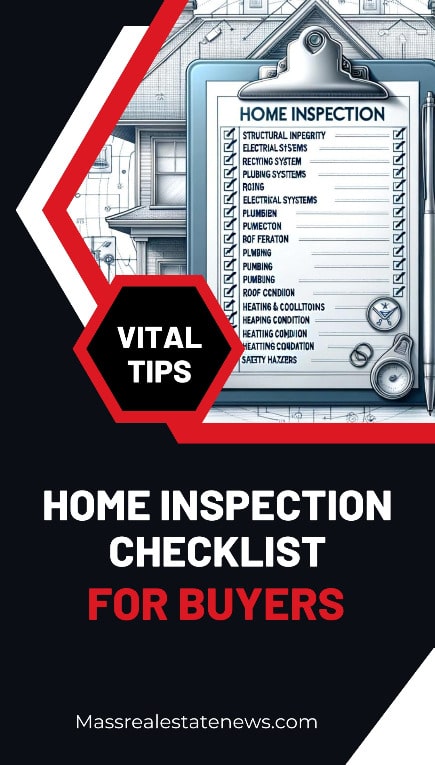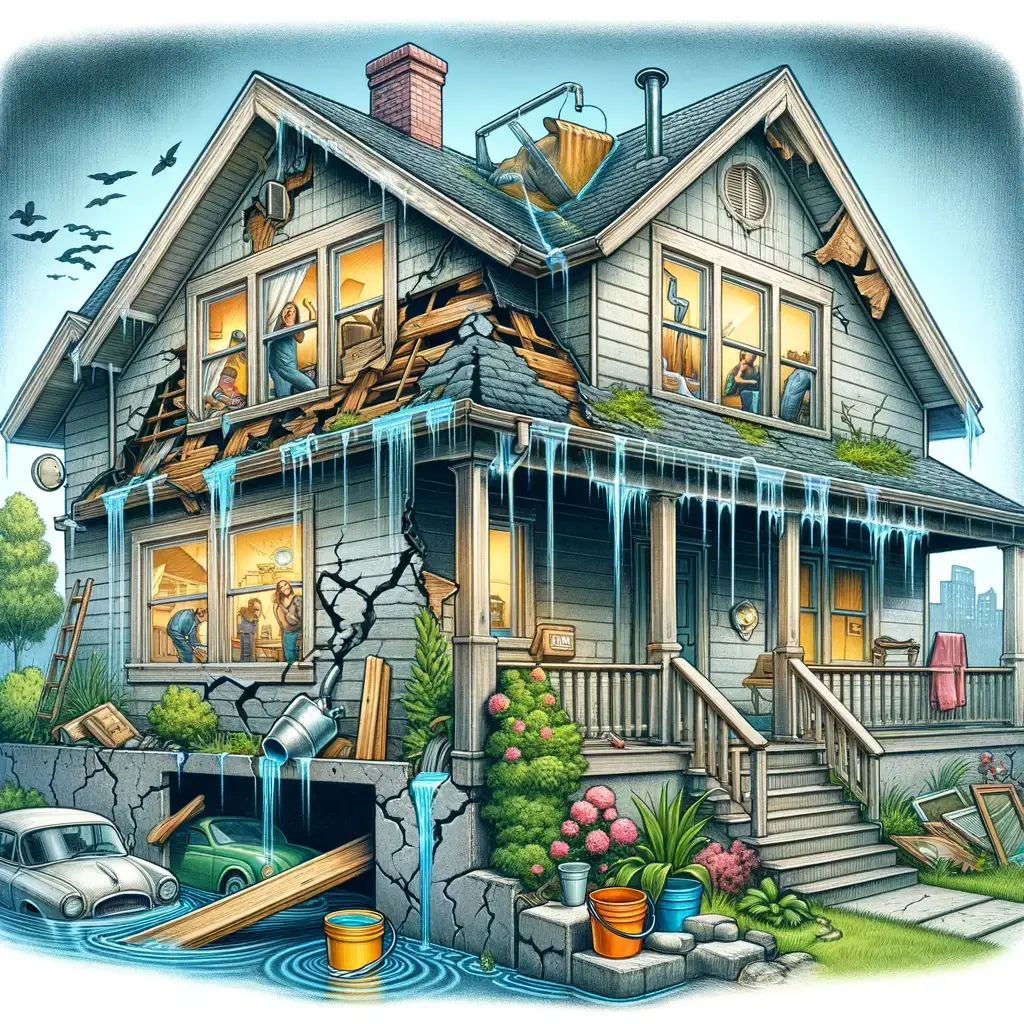Critical sections such as the roof, foundation, plumbing, HVAC, and electrical systems must be examined when conducting a home inspection in Massachusetts.
Understanding these areas can reveal hidden problems and prevent costly repairs in the future. But remember that there’s more to it than just the visible parts. Hidden spots often hold surprises that might catch you off guard if not inspected properly. Ready to get started?
Buyers should include crucial items such as checking the roof, foundation, plumbing, HVAC, circuit panels, electrical systems, windows/doors, attic, water fixtures, flooring, and signs of water damage. Thoroughly inspecting these areas ensures the property is in good condition before purchasing.
From nearly forty years experience as a Massachusetts real estate agent, a home inspection is one of the vital steps in the process. It is essential for buyers and sellers to understand the condition of the property.
You may find out you need to walk away from the property if there are items you didn’t image would be discovered.
For sellers, it’s wise to take care of any issues before listing for sale. For buyers, understanding any significant structural or mechanical defects is wise.
When you have a handy house inspection checklist, you’ll be more likely not to miss any problems. Let’s examine everything you should know.
How to Prepare For a Massachusetts Home Inspection
To prepare for a home inspection as a buyer, there are several proactive steps you can take:
- Research and Hire a Professional Home Inspector: Begin by researching and vetting potential home inspectors. Choose someone with a good reputation and relevant experience to ensure a thorough inspection. The cost of a Massachusetts inspection is well worth it.
- Review Documentation and Disclosures: Before the inspection, review any available property disclosures, documentation about the house from the local building department, and any other relevant information. This can help you understand the property’s history and identify specific areas you might want the inspector to focus on
- Prepare a List of Questions and Concerns: Based on your review of the property’s documents and observations during visits, prepare a list of specific questions or concerns about the house. This could include areas you’ve noticed that might need repair or systems you’re particularly concerned about. Remember, the seller may not fix everything. Most homes are not perfect.
- Familiarize Yourself with the Inspection Process: Understanding what a comprehensive home inspection covers can help you follow along with the inspector and ask informed questions. A typical inspection will include examinations of the home’s foundation, roof, attic, exterior and interior walls, plumbing, electrical systems, heating and cooling systems, and more.
- Attend the Inspection: If possible, attend the inspection in person. This lets you observe the process, ask questions directly, and gain firsthand insights into the property’s condition.
- Be Prepared for the Duration: Depending on the property’s size and condition, inspections can last several hours. Ensure you allocate enough time in your schedule to be present without rushing.
Essential Home Inspection Checklist for Buyers in Massachusetts
When inspecting a potential new home, many aspects must be carefully considered. It’s not just about the layout or the color of the walls. What matters is how the house is built and whether everything is in good working condition.
A thorough home inspection can reveal the property’s hidden strengths and potential problems.
Homebuyers should be equipped with a strategic guide as they navigate each evaluation step to ensure that no crucial aspect is overlooked during the inspection process.
This checklist systematically covers all vital components of a home. Each part requires careful consideration, from the roof to the foundation, plumbing, HVAC, electrical systems, and even those hard-to-reach hidden areas.
Starting from the top down, thoroughly examining the roof for damage or signs of wear and tear is crucial.
Leaks, missing or damaged shingles, and the roof’s overall condition can help you understand if this area needs immediate attention or potential future expenses.
Foundation issues can lead to significantly expensive repairs and greatly impact your decision to purchase. Ensuring that all structural elements are sound is critical for a safe and secure investment.
Moving on to the plumbing system – leaky pipes, poor water pressure, or old fixtures can be inconvenient and costly to repair. The HVAC and electrical systems are equally important.
Inadequate cooling or heating and faulty wiring can pose safety hazards and affect long-term comfort in your new home.
Hidden areas, often out of sight and out of mind, deserve equal scrutiny. Inspecting these spaces could reveal underlying issues such as mold, moisture, or pests that may require intervention.
Printable Checklist
A checklist that comprehensively covers all these areas allows an organized approach to weigh each property based on empirical data rather than emotional appeal.
By following a strategic guide and attending to crucial details like those outlined in this checklist, you can decide whether a particular property meets your needs and expectations for your future home.
With this comprehensive checklist in your arsenal, let’s go one step further preparing for your home inspection. We’ll now look at how you can actively prepare for this essential evaluation.
Preparing for a Home Inspection in Massachusetts
As you prepare for the home inspection, imagine it as a journey where you need to clear the path for your inspector. It’s like getting your house ready for guests, except this time, you want to ensure all the nooks and crannies are visible.
Clean and Clear Access
When expecting a home inspector’s visit, ensuring they have unobstructed access to all the areas they need to inspect is crucial. This means decluttering, removing items that may block systems essential like HVAC units, or unlocking doors that lead to components such as the water heater or electrical panels.
Accessing these areas can facilitate a more thorough inspection, leading to fewer missed issues.
So, while you’re not tidying up for visitors in the traditional sense, clearing paths and making systems accessible will have them move seamlessly through their evaluation without any avoidable hindrances.
It would help to ask your buyer’s agent to speak to the listing agent to ensure the homeowner addresses any blockage or obstructions. The inspector’s job should be straightforward.
Remember: Making sure these areas are clear benefits the inspector and ultimately helps protect your investment by ensuring every aspect of your potential new home is thoroughly evaluated.
With everything in place and organized for the inspector, you are also one step closer to knowing your future home more intimately and understanding its condition and needs far better than before. The little extra effort makes all the difference here!
Attend the Inspection
If possible, consider attending the home inspection. Whether you’re a DIY enthusiast or have never changed a lightbulb, this experience lets you better understand the property’s condition. It’s part of the due diligence process.
You can observe any issues the inspector notices upfront and ask questions as they arrive. The inspector can also explain their findings in detail. The best Massachusetts inspectors will offer recommendations based on their assessments.
By being there yourself, you might learn about minor quirks specific to your new house, such as operating particular systems and effectively maintaining different aspects of your home.
Attending also paints a more vivid picture of potential issues raised in the report later. You’ll remember nuances in tone and wording—a luxury not granted by simply reading over notes at a later stage.
From experience, being at numerous home inspections in Massachusetts, I know what is said vs. what is put in an inspection report can sound dramatically different.
Many home inspectors will cover their behinds in the report. Sometimes, it sounds as if the house should be condemned. Real Estate agents call it CYA.
Even more importantly, it gives you peace of mind knowing that by being hands-on in this crucial process. You’ll be able to make informed decisions about one of the most significant purchases of your life—one that goes beyond cold facts and numbers into real-life experiences.
Informed buyers are better equipped to make confident decisions throughout the home-buying process. Continuing on this path of empowerment, let’s explore “Key Items to be Inspected” during a home inspection.
Essential Items to be Inspected
A home inspection is like getting an X-ray of your potential new home. The inspector helps uncover any hidden issues so you know exactly what you’re buying and what immediate or future repairs may be needed.
Let’s review the crucial elements that the inspectors will focus on:
Roof
The roof is a house’s most critical component and requires meticulous evaluation. A professional inspector will look for damaged or missing shingles, signs of leakage inside the home, and any structural problems that could affect the roof’s integrity.
Just as we pay attention to our skin for signs of damage, a careful inspection can reveal potential issues with the roof that might otherwise remain unseen.
This conscientious approach can save both money and frustration in the long run.
Plumbing
A thorough examination of the plumbing system is essential. The inspector will look for leaks, water pressure irregularities, and proper drainage in sinks, bathtubs, and showers.
Inspecting plumbing systems involves examining the condition and age of pipes and visible leaks and pressure checks. Pipes from outdated materials may raise red flags due to potential corrosion or wear. The best inspectors will advise on decisions about maintenance requirements.
Electrical Systems
Your home’s electrical system is vital in maintaining comfort and security. During the inspection, outdated wiring, non-functional outlets, and electrical safety hazards will be meticulously examined.
Think of this part as akin to a health check-up at the doctor’s office—efficient and up-to-date electrical systems contribute to a safer living environment, much like regular exercise maintains good physical health.
HVAC
Determining the functionality of your heating and cooling systems is paramount, especially in maintaining indoor air quality. An inspector will assess if the HVAC systems operate efficiently without any underlying problems that may lead to costly repairs.
Analogously, overlooking HVAC inspections could be likened to disregarding regular medical check-ups. Lack of careful examinations can lead to undiagnosed issues that can subtly affect overall well-being over time.
A meticulous inspector will have a checklist they follow.
Structural Integrity
Examining the structure’s integrity for signs of cracks, settlement, water damage, or related structural concerns during an inspection—the foundation upon which your entire home stands—is crucial to prevent more significant issues down the road.
It’s comparable to checking the spine for misalignments or hairline fractures. Detecting these structural issues early means they can be addressed before they worsen, resulting in hefty maintenance costs.
Hidden Areas
Beneath every surface lies what we cannot immediately see. Inspectors will look beyond typical sightlines—the sort that would reveal hidden problems such as mold growth or pest infestations that could significantly impact your investment and your health if overlooked.
It is much like visiting a doctor for a comprehensive health check-up rather than addressing ailments as they appear. It’s about seeking prevention rather than cure. It ensures all concealed aspects of your potential home are uncovered through meticulous scrutiny.
Knowing what areas will receive intense scrutiny during a home inspection allows buyers to make informed decisions about their prospective property investments. It’s about understanding the prevalent nuances hiding behind pristine walls and glossy exteriors.
How Long Does a Home Inspection Take?
The duration of a home inspection in Massachusetts can vary based on several factors, including the size of the property, its age, and the number of areas to be inspected.
Generally, a home inspection can last over two hours for an average-sized house. Smaller properties like condos may require an hour or more to complete. However, it’s important to note that the actual duration of a home inspection could depend on the property’s specific conditions and characteristics.
It is essential to understand these are rough estimates for inspection times. The unique aspects of each property can significantly influence how long the process takes.
If you’re scheduling a home inspection, discussing the expected duration with the inspector beforehand might be helpful based on your property’s specifics.
Understanding the Home Inspection Report
The home inspection report is akin to a roadmap that guides you through the property condition you’re considering. It’s not just a list of issues; it’s replete with crucial insights that can sway your decision-making process.
This detailed document from the inspector will include descriptions of the property’s significant features, such as the roof, plumbing, electrical systems, HVAC, and more.
But the report doesn’t stop there. It also covers any issues found during the inspection and provides specific details about those problems.
Understanding the report becomes pivotal in guiding your next steps. For instance, if the report highlights issues with the foundation or significant structural concerns, these matters could significantly impact your decision to purchase.
On the other hand, minor issues like a leaky faucet or chipped paint can be manageable and shouldn’t deter you from buying the home.
Moreover, inspectors often include recommended actions in their reports. This can provide valuable insights into what steps should be taken to address specific issues.
For example, they might suggest seeking further evaluation from a specialist for a particular problem or indicate routine maintenance tasks that need attention.
Some might argue that reading the home inspection report is daunting and overwhelming. However, breaking it down by taking one section at a time makes it more manageable. Remember, ignorance is not bliss when making one of the most significant investments of your life.
Here is an example of what you should expect from a home inspection report. Ask your Massachusetts inspector what they will provide.
Spotting Potential Issues During a Massachusetts Inspection
Walking through a property during an inspection can be both exciting and nerve-wracking. The goal is to evaluate if the property aligns with your needs carefully.
You’re not just assessing aesthetics or space. You aim to identify potential issues that could later escalate into major problems.
Foundation Cracks: Begin with the exterior and inspect the foundation walls for cracks. Small ones are typical, but substantial cracks or bulges could signify more significant structural problems.
Drainage Problems: Survey the yard and areas around the house for signs of water pooling. Inadequate drainage can lead to moisture seepage in basements or crawl spaces, potentially leading to damage and mold growth.
Plumbing Leaks: Activate faucets and scrutinize the areas under sinks for any signs of leaking pipes. Additionally, consider low water pressure or slow drains as indicators of plumbing issues.
Roof Damage: Search for missing or damaged shingles, areas where the roof sags, or signs of water damage in the attic.
Electrical Issues: Test light switches and outlets for proper functionality. Note any outdated wiring systems that might pose safety risks.
HVAC Systems: Thoroughly examine heating and cooling systems for any unusual smells or noises when in operation.
Water Damage, Mold, Pests: Be attentive to discolored patches on walls and ceilings, which might signal water damage or mold. Also, watch out for indications of pests such as droppings or gnawed wood.
You’ll Be Prepared For Potential Negotiations
Focusing on these areas during an inspection can identify red flags that may necessitate further investigation or negotiation with the seller. Taking your time to inspect each area outlined in the checklist meticulously is crucial for making an informed decision about purchasing the property.
Remember, though it can be daunting to look for potential issues, this step is vital to ensure that you invest in a safe and sound property. Observing these details can provide valuable insights into the kind of care and maintenance the property may require.
Knowing what to look for during a home inspection is essential, as is knowing what questions to ask your inspector. You can gain deeper insights into the property’s condition and make well-informed decisions by asking the right questions.
Remember that when negotiations are needed due to problems, it can delay how long it usually takes to close on a house. This is especially true when you need to have contractors examine the issues.
Essential Questions to Ask Your Inspector
A home inspector is like a detective investigating a crime scene, except in this case, the “crime scene” is a house. They look for clues to hidden problems and provide detailed insights into the property you’re considering. It’s essential to make sure you get as much information as possible.
So, what should you be asking them? Let’s explore some fundamental questions vital for making an informed decision about purchasing a property.
1. What are the Major Issues You Found?
This question gets straight to the point. Listen carefully to understand not only what the significant issues are but also how severe they are. It helps gauge whether these issues can be fixed or if they pose long-term risks and costs.
You can also speak to your Realtor about which issues to ask the seller to remedy or skip.
2. What Routine Maintenance is Required for this home?
Understanding a home’s regular upkeep needs ensures longevity and minimizes unexpected repairs. This question helps plan for future maintenance tasks and budget any ongoing costs associated with the property’s care.
3. Are There Any Potential Safety Concerns?
Safety comes first, especially when it comes to your potential future homes. Identifying any safety concerns, such as electrical issues, mold, or structural risks, ensures you can make an informed decision regarding your family’s well-being.
4. Can You Provide Further Details on HVAC and Plumbing Systems?
The heating, ventilation, air conditioning (HVAC), and plumbing systems are critical home components. Understanding their condition and expected lifespan can help determine whether significant investments will be required soon.
5. What Issues Should I Prioritize for Repair if I Decide to Purchase this Home?
When buying a home, there will always be some issues that need addressing sooner rather than later. Asking your inspector which issues should take priority can guide negotiations and help set expectations for post-purchase repairs.
By consistently asking these key questions, you empower yourself with valuable insights that go beyond the apparent condition of the property. These insights ultimately aid you in making a well-informed decision regarding one of life’s most important investments—your home!
In summary, having the right questions is like a powerful toolkit when navigating the intricate terrain of real estate sales. Using a checklist for home inspections will keep you on track.
Good luck with your home inspection journey.














No Comment